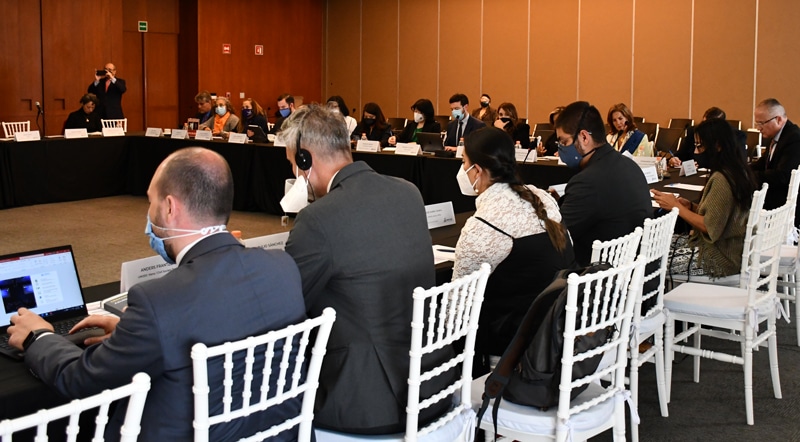Mexico City (Mexico), 12 May 2022 – Transnational organized crime – whether it be drug trafficking, human trafficking, money-laundering, migrant smuggling, etc. – can devastate societies. It can compromise the ability of states to effectively govern their populations and provide services. It may widen gaps between genders, ethnic groups, economic classes, and more, and overwhelming affects the most vulnerable. The COVID-19 pandemic has exacerbated these challenges, allowing organized criminal groups to exploit the gaps left by governments’ reallocation of resources.
Moreover, they threaten the ability to achieve Sustainable Development Goal (SDG) 16, under which Member States committed to promoting peaceful and inclusive societies for sustainable development, provide access to justice for all and build effective accountable and inclusive institutions at all levels.
Tackling such a complex problem requires the coordinated efforts of many actors, including the private sector, academia, and civil society. While the public sector leads crime prevention and criminal justice efforts, private sector enterprises can leverage their resources and networks to build sustainable and responsible businesses, raise awareness among employees, partners and clients in their companies, and contribute tools, critical data and instruments to help governments tackle organized crime. On the other hand, civil society and academia provide unique on-the-ground perspectives, highlighting the needs of organized crime victims and delivering much needed services – sometimes in place of governments. Moreover, these actors develop rigorous research that inform interventions from governments, other stakeholders and international organizations such as UNODC.
To help states tackle transnational organized crime, the United Nations Office on Drugs and Crime (UNODC) uses a review process whereby states identify country-specific priorities to combat transnational organized crime. However, civil society participation in the review process has at times been limited, although Resolution 9/1 of the Conference of the Parties to UN Convention against Transnational Crime (UNTOC) provides for the participation of non-governmental stakeholders in the review process.
On 27 April, UNODC and the Government of Mexico launched the first-ever Pilot Initiative , aiming to bring together representatives from government, civil society, academia and the private sector to ensure that their perspectives and expertise are included in the review process.

“This Pilot Initiative has a special role because it will help us to enhance our engagement with civil society in fostering inclusive societies in the promotion of SDG16.” – emphasized Eduardo Jaramillo Navarrete, Director General for the United Nations at the Ministry of Foreign Affairs of Mexico. “The UNTOC and its Review Mechanism will provide the basis for this exchange of ideas about the processes involved in the daily fight against crime and violence.”
At Mexico’s Ministry of Foreign Affairs, stakeholders identified key priorities on preventing transnational organized crime, including the creation of a database for open and reliable data to inform Government policies on crime prevention; the establishment of a mechanism for coordination with the Government to create strategies and action plans and ensuring that the review process is transparent and open to non-governmental stakeholders; and making civil society trainings available to the police.
Stacy de la Torre, Head of Programmes at UNODC Mexico office, emphasized UNODC’s role in supporting States in the fight against transnational organized crime through the implementation of the Convention and its Review Mechanism. “The engagement between Member States and civil society in this review process is a reflection that no single government can tackle transnational organized crime on its own”.
As the next step, the Government will convene a follow-up meeting in late 2022 to review the progress made in the implementation of UNTOC, as well as how the Government is incorporating the priorities submitted by the stakeholders.
As Norma Sanchez, an independent expert on transnational organized crime, noted, “the Pilot Initiative has been a very fruitful and inspiring experience that motivates me to continue contributing, with an anti-corruption and transparency approach, to prevention policies against organized crime, especially for the most vulnerable people, children and adolescents.”
UNODC will continue to support the Government of Mexico in the activities related to the Pilot Initiative and hopes that other countries will be inspired to take similar actions in line with their national realities.
** *** **
The project of Stakeholder Engagement for the UNTOC, its Review Mechanism and Related Activities (SE4U) is made possible by the generous financial support of the Government of the United States.









